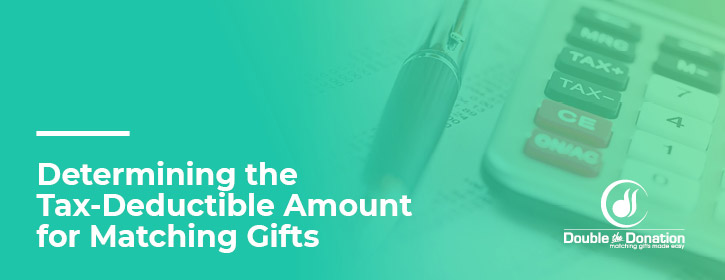Determining the Tax-Deductible Amount for Matching Gifts
If your organization derives a significant amount of funding from membership programs, annual fundraising galas, or special events, you may wonder whether those donations are eligible for corporate matching gift programs.
By not promoting matching gifts to donors, your organization may be leaving money on the table. In almost every case, the tax-deductible amount of nearly all cash and stock contributions is eligible to be doubled through employer matching gift programs.
To take advantage of these important revenue opportunities, go over the following key subjects:
- The Relationship Between Tax-Deductible Contributions and Matching Gifts
- Calculating the Tax-Deductible Amount for Matching Gifts
- How a Matching Gift Database Can Help
Need a refresher on corporate philanthropy? Visit our guide to learn more about corporate matching gift programs. Otherwise, let’s get started!

1. The Relationship Between Tax-Deductible Contributions and Matching Gifts
When nonprofits have membership programs or host special events, there should be a defined tax-deductible amount listed. This should be a specific dollar amount. Also, it should be above the fair market value (FMV) of any benefits received.
That way, attendees and their employers know the specific amount for IRS income tax reporting purposes. The tax-deductible amount of the donation, event ticket, or membership is also what donors should submit to their employers when requesting a match.
It’s the responsibility of the organization to determine the tax-deductible amount and inform event attendees or its program’s members.
For instance, for events, the tickets should have a line similar to the following: “Did you know that $X of your ticket is tax-deductible? If your employer has a matching gift program, this amount might be eligible to be matched.” To learn other ways to promote matching gifts to attendees, visit this guide about matching gifts for special fundraising events.
Now that you know the tax-deductible amount of contributions can be matched, let’s dive into how to calculate it.
2. Calculating the Tax-Deductible Amount for Matching Gifts
As previously stated, it’s up to the nonprofit organization to determine the tax-deductible amount of each contribution. The first step is to determine the FMV of the benefits received.
There are a few ways to do this. Start by comparing the benefits received by the donor with what those benefits would cost if it were not a fundraiser.
For example, let’s say you charge $500 for an annual gala ticket. At the gala, there’s a performance by a well-known band as well as a five-course dinner. Let’s say the nonprofit determines the dinner would cost $50 from a local restaurant while a ticket to see the band would cost $100. In this case, the fair market value of the gala ticket would be $150. Therefore, the tax-deductible amount of the ticket would be $350.
Donors should use this fair market value, rather than the overall purchase price, on their company’s matching gift form.
While each organization has full discretion in determining the FMV, the key is to ensure the values placed on each benefit are reasonable. For instance, is it reasonable for a steak and lobster dinner with dessert to cost $10 at a five-star restaurant? Probably not. An appropriate method is to take a look at the menu of a local restaurant and use its pricing as guidance.
Calculating the FMV isn’t an exact science. It could vary by several dollars and any amount within a reasonable range would be acceptable for government reporting and matching gift requests. The important part is that your organization is taking a fair and honest approach when estimating the FMV.
3. How a Matching Gift Database Can Help
When hosting event fundraisers or heading a membership program, nonprofits might overlook corporate giving opportunities. Corporate philanthropy is vital for nonprofits. Missing out on these opportunities can be detrimental to an organization. That’s where Double the Donation, the industry-leading matching gift database, can help!
By adding a matching gift database to your tech toolkit, your nonprofit won’t overlook revenue from corporate giving programs. For instance, Double the Donation:
- Enables donors and volunteers to search for 24,000+ companies.
- Gives users all available info and forms on companies’ giving programs.
- Allows nonprofits to embed the tool on their online fundraising channels.
- Allows nonprofits to do even more with matching gifts!
Before your event, research your attendees’ employers. You’ll be able to pinpoint which donors are matching-gift eligible. That way, you’ll know who to approach about corporate giving at your event. Whenever someone signs up for your membership program, your team can see which donors might be match-eligible, too! Then, you can reach out to them.
Plus, there’s even more to Double the Donation. Their tool streamlines the process by automatically identifying match-eligible donors in a comprehensive database, following up with them until they complete the match process, and even creating an automated plan for matching gifts! Either tool is great for pinpointing corporate giving opportunities.
Many different types of donations to your organization have a tax-deductible component that can be submitted to corporate matching gift programs. Make sure you’re communicating this with your donors.
Now that you know more about tax-deductible contributions, relay this information to your team and supporters. Start boosting your nonprofit’s matching gift revenue now!



